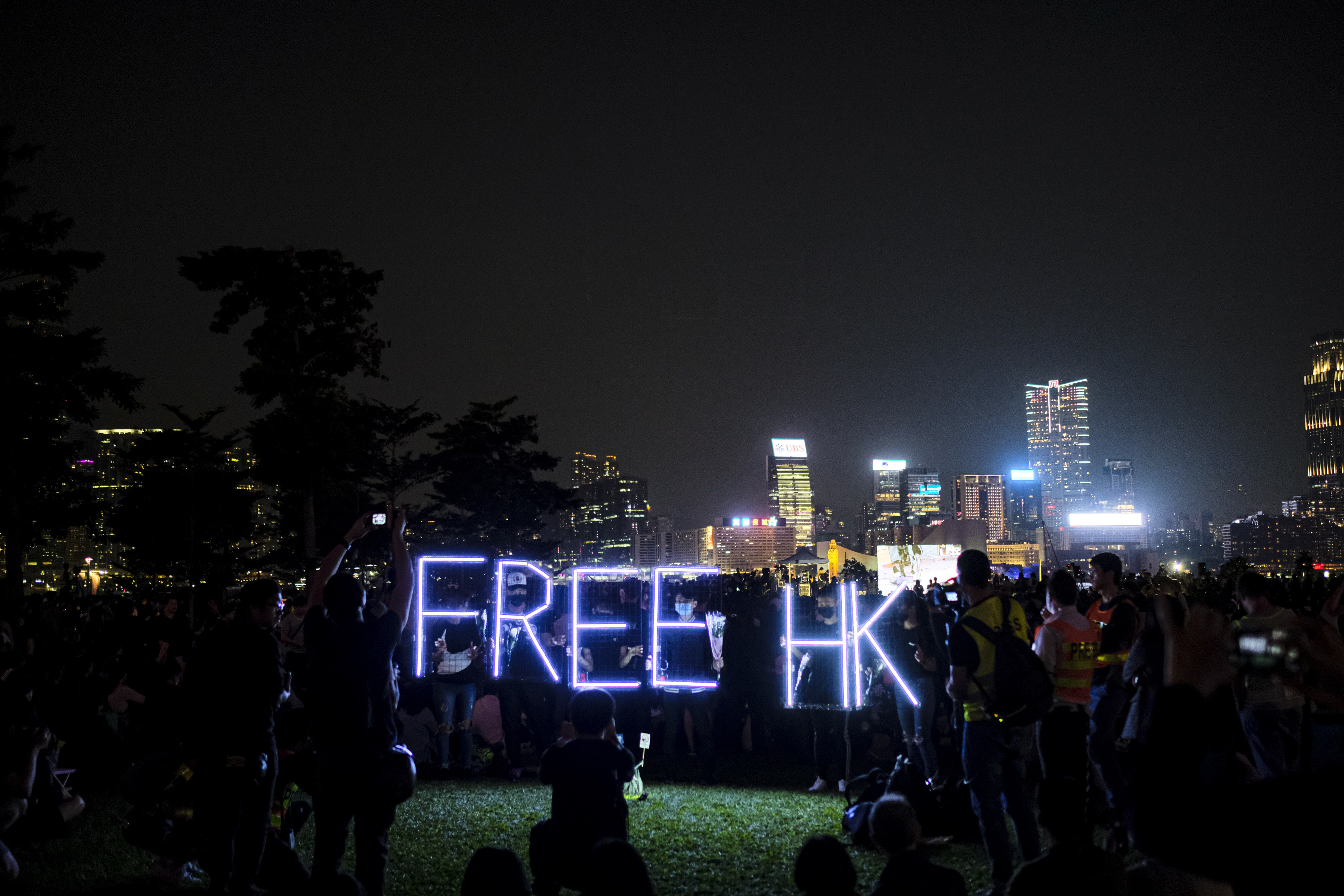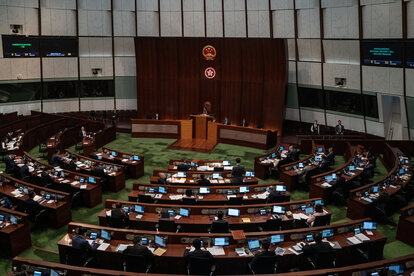Hong Kong
Hong Kong in the era of national security - Legislation under Article 23

A "Free Hong Kong" sign
© picture alliance / ZUMAPRESS.com | Keith TsujiThis week, in a fast-tracked legislative process spanning just over 11 days, a package of laws was rushed through and unanimously passed by Hong Kong’s Legislative Council. The “Safeguarding National Security Bill” implemented under Article 23 of Hong Kong‘s local constitution, the Basic Law - colloquially known as “Article 23 legislation” - is designed to fill “loopholes” in the existing legislation. The Hong Kong government argues that legislation under Article 23 is essential in ensuring stability and preventing a repeat of the 2019 pro-democracy protests. In reality, it encompasses great potential for misuse and arbitrary application, leading to widespread restriction of personal freedoms and civil liberties.
The new security legislation has not come out of nowhere – already in 2003 Hong Kong authorities tried to implement the bill. However, back then, these attempts were met with widespread protests as more than half a million people peacefully took their discontent to the streets. As a result of this opposition, authorities withdrew the legislation. Over 20 years later, the 2024 version of Article 23 unanimously passed within a matter of days without major debates or meaningful consultations. Today, the world – and Hong Kong – are a different place, and many of the freedom-loving people of Hong Kong have been silenced. Since the draconian National Security Law (NSL) was imposed four years ago, the once-promised freedoms under the One Country, Two Systems framework have been consistently eroded by Beijing under the pretext of "safeguarding national security".
Using the NSL, Hong Kong’s electoral institutions have been transformed and cleansed of opposition forces – prominent pro-democracy activists and lawmakers like Joshua Wong or Jimmy Lai have been arrested while others were forced to flee. Numerous NGOs and independent media outlets, like Apple Daily or recently Radio Free Asia, were forced to close or shut down as an act self-censorship under the NSL. International organisations, such as the Friedrich Naumann Foundation, responded by moving their offices outside the Chinese Communist Party's (CCP) sphere of influence. As early as 2020, the liberal political foundation relocated to Taiwan, as it was no longer possible for them to carry out their work under the conditions of the NSL and stand up for the liberal principles of democracy and the rule of law without putting partners and employees at risk. In another shocking move just last year, Hong Kong police placed HK$1m (117,000€) bounties on several well-known pro-democracy activists like Joey Siu or Finn Lau who were wanted for “seriously endangered national security” through “inciting secession” and “collusion with foreign forces”.
Many already feared the worst for Hong Kong in the summer of 2020 when the NSL was imposed. However, the sheer speed and ruthlessness with which any kind of opposition was cracked down within just a few months shocked even pessimistic observers. Hong Kong’s pro-democracy voices have been in the authorities' crosshairs ever since, and today, almost all forms of public dissent are under threat.

A general view shows the chamber of the Legislative Council complex as the second reading of the Safeguarding National Security Bill is taking place in Hong Kong, China, on March, 2024. The Legislative Council in Hong Kong is currently resuming the second reading of the Safeguarding National Security Bill, also known as the Article 23 legislation.
© picture alliance / NurPhoto | Vernon YuenThe rule of fear
Legislation under Article 23 targets offences such as “espionage’, “treason”, “theft of state secrets”, as well as “sedition” and “foreign interference”, and envisages their punishment with sentences of up to life imprisonment. While many of these offences were already covered by the NSL, the new bill greatly expands the scope of government authority and puts an even greater threat on interactions with “foreign entities“. Further, the new security legislation introduces expansive and ambiguous interpretations of "state secrets" and "external interference". Thereby, legislation under Article 23 gives authorities the tools to systematically legitimise their oppression and further investigate and silence political dissidents by restricting remaining political and civil liberties. This is likely to lead to a further destabilisation of legal predictability and judicial autonomy, as well as further erosion of the rule of law. Hong Kong’s law enforcement has also been endowed with broadened authority and relaxed restrictions. This can prominently be seen in the elongation of the detention period for suspects without charge; after the enactment of legislation under Article 23, suspects can now be held for 16 days – and their rights to meet legal representatives have also been curtailed.
Under this new security legislation, actions occurring outside of Hong Kong by residents and businesses from Hong Kong are now also subject to scrutiny. This change reflects the CCP’s efforts to target overseas pro-democracy activists and dissenters labelled as "anti-China elements." Individuals suspected of financing “overseas critics” – including parents giving money to their children – may now face imprisonment. Consequently, when legislation under Article 23 enters into force on 23 March 2024, it will pave the way for new criminal offences and harsher punishments, ultimately leading to even more intense oppression. The bill will not only grant the government power to quash dissent, but its extraterritorial reach threatens to label anyone as a national security threat as the bill can be used as a new tool for transnational repression.
Legislation under Article 23 can essentially be understood as a license to silence dissents from Hong Kong while simultaneously further harmonising China’s and Hong Kong’s national security systems. Just as Xi Jinping has made national security the mainland’s priority, the CCP has tried to extend its leadership's influence over Hong Kong. The NSL in 2020 and now the new security legislation are used to imprint Beijing’s authoritarian hallmark on the once-free city. Now, instead of reflecting the desires of the people of Hong Kong – who are still overwhelmingly in favour of democratic representation – the local government is increasingly aligning with the directives of the CCP. The expedited passage of legislation through parliament echoes Xi Jinping's election process—a unanimous decision with no dissenting voices. As a result, the people of Hong Kong continue to see their fundamental freedoms trampled upon by the mainland’s leadership.
Hong Kong’s governments will now be able to further criminalise a broad range of interactions with foreign governments and organisations under its sweeping provisions and broad definitions of “theft of state secrets“ and “espionage“. Thereby, legislation under Article 23 also further endangers Hong Kong’s status as an international financial hub and undermines Hong Kong's legal system as being distant enough from the CCP’s reach. While once being known as Asia’s flourishing financial centre, international businesses and foreign investors in Hong Kong now already worry about a limited free flow of information and being targeted by the legislation. This growing uncertainty could only be detrimental to Hong Kong’s business environment, which has already lost a lot of its former attractiveness since the COVID pandemic and introduction of the NSL. Many Chinese business people and international investors have already moved their funds and investments to Singapore and Tokyo – they are unlikely to return now.
Criminalising the peaceful exercise of human rights
While the local government refrained from reintroducing the bill in 2003, the Chinese government has continuously urged Hong Kong to uphold its duty to "safeguard national security. After the bill passed this month, the Chinese leadership has given its “full support“ to legislation under Article 23 and Hong Kong’s Chief Executive John Lee has claimed the bill “a historic moment for Hong Kong“. In contrast, the legislation, especially since it was passed in the blink of an eye, which makes it seem somewhat like a formality, has prompted criticism from NGOs, human rights activists, lawmakers, and international institutions. Among them, prominent liberal voices from the German and European Parliament which have stated the new legislation under Article 23 will „criminalise the peaceful exercise of human rights“. The possibility of introducing targeted sanctions under the EU's Global Human Rights Sanctions Regime, as well as the establishment of lifeboat-schemes for Hong Kongers, and the review of the status of Hong Kong's Economic and Trade Offices in the EU, have already been the subject of discussion since the NSL came into force. With these demands having repeatedly been voiced by Members of the European Parliament, they may gain further support in the light of the new Article 23 legislation.
Amplifying the perceived threat of external forces is a classic tactic employed by dictators to justify their repressive domestic policies. As part of a worrying global trend of the number of autocracies increasing worldwide while the number of liberal democracies decreases, Hong Kong has experienced a drastic shift towards autocracy and a decline in democratic values in recent years. Today, already almost 40 per cent of people worldwide are living in countries that are considered “not free”, and the CCP has sought to expand its authoritarian influence beyond the mainland. The enactment of legislation under Article 23 brings mainland Chinese legal principles regarding “national security“ and “state secrets“ directly into Hong Kong's legal framework, presenting a severe peril to civil society and the city's future. The new legislation endeavors to further isolate Hong Kong from the liberal democratic sphere by endowing the government with expansive authority for political manipulation but also to expand the reach of surveillance and exert greater political control over society. In mainland China, similar legislation has already been employed to suppress fundamental rights and target dissenting voices, journalists, and human rights defenders.
As a result of Beijing tightening its authoritarian grip, Hong Kong in the era of national security is no longer the free and vibrant city it was just a few years ago. In the end, those targeted by authorities under the guise of Article 23 legislation are not likely to be external entities but rather individuals who stand for the universal principles of democracy, freedom, and human rights—values that the people of Hong Kong have steadfastly pursued and that Beijing is chipping away at one by one.
Katharina Osthoff works for the FNF in Brussels as Human Rights & EU Liaison Manager. Previously, Ms Osthoff worked as a Political Advisor for Foreign Affairs at the European Parliament in Brussels and at the German Bundestag in Berlin with a focus on Asia and China.
